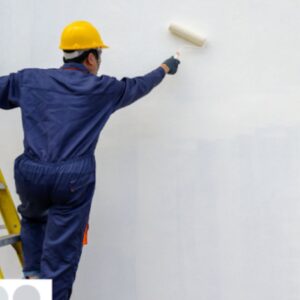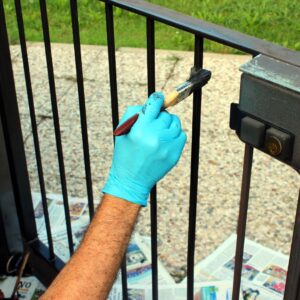Why Waterproofing Your Walls Saves Money in the Long Run?
When we think about waterproofing, it may not seem important at first, but it can be one of the best decisions you make to protect your home and help you save money in the long run. Whether you are building a new house or maintaining an old one, waterproofing is essential.
In this article, we will explore:
- What is waterproofing?
- Does a wall need waterproofing?
- What is the main benefit of waterproof coatings?
- What are the benefits of waterproofing?
- Is waterproofing important in construction? Why?
- How long does wall waterproofing last?
- Is it worth it to waterproof a home’s exterior?
- How to know if waterproofing has failed?
- What is the negative side of waterproofing?
- The truth about waterproofing: myths vs. facts for homeowners

What is waterproofing?
When you protect surfaces from moisture and water by applying a barrier coating that prevents water or moisture penetration, it is called waterproofing.
Does a wall need waterproofing?
Yes, every wall that comes in contact with moisture requires waterproofing. This includes both external and internal walls, such as:
- External walls that are exposed to rain and humidity.
- Interior walls are exposed to water sources from bathrooms, kitchens, and basements.
Countries like India need waterproofing due to their humid climate, heavy monsoons, and fluctuating temperatures.
What Is the Main Benefit of Waterproof Coatings?
The main benefit of waterproofing is that it creates an impermeable barrier that prevents water and moisture from seeping into the walls. Waterproof coatings help:
- Seal cracks and pores in concrete.
- Protect steel bars from corrosion.
- Increase wall lifespan and maintain aesthetic appeal.
What Are the Benefits of Waterproofing?
Waterproofing offers many benefits beyond just preventing leakage issues. Let’s look at them one by one:
1. Prevents Structural Damage
Moisture can silently destroy your building’s structure. When water penetrates walls, it weakens plaster, corrodes metal rods, and causes cracks. Over time, the structural strength of your walls decreases. Waterproofing helps create a protective barrier that keeps your walls strong and safe.
2. Reduces Maintenance and Repair Costs
Without waterproofing walls are constantly exposed to moisture, leading to peeling paint, mould growth, and efflorescence (a white, powdery deposit). Waterproofing reduces such problems, cutting down on frequent maintenance and repair costs.
3. Minimises the Chances of Filing Insurance Claims
Water damage is one of the main reasons for filing home insurance claims, and repairs can be costly. Investing in quality waterproofing for your walls, floors, and roofs helps prevent long-term damage and reduces the risk of insurance claims.
4. Improves Indoor Air Quality
Damp walls encourage mould and mildew growth, which can cause allergies and respiratory issues. Waterproofing helps keep your interior walls dry and healthy.
5. Enhances Property Value
In India, homes in coastal cities such as Mumbai, Chennai, Visakhapatnam, Goa, and Kolkata often experience leakage problems due to humidity and heavy rainfall. When buyers look for resale properties, their top priority is a leak-free home. Hence, if you are the owner of such a property, proper waterproofing will help you get a higher resale value for your home.
6. Increases Energy Efficiency
Damp or wet walls conduct heat faster, making homes hotter in summer and colder in winter.
Dry walls help maintain a stable indoor temperature, keeping homes cooler in summer and warmer in winter, reducing the need for fans, coolers, or heaters, and ultimately lowering your year-round electricity bills.
7. Protects Basement Floors
Basement floors are located at the lowest part of a building and are made of concrete to strengthen the structure. However, constant underground water pressure can cause cracks, allowing moisture to seep in. Waterproofing your basement floor ensures long-term protection for your building.

Is Waterproofing Important in Construction?
Yes, waterproofing is crucial in construction. It protects both new and existing structures from long-term deterioration, acting as an insurance policy for your building.
Waterproofing in construction helps:
- Protect structures from damage.
- Keep interiors clean and dry.
- Reduce repair frequency and overall costs.
It’s always better to do waterproofing during construction, not after, because prevention is better than cure.
How Long Does Wall Waterproofing Last?
The lifespan of waterproofing depends on three factors: the type of product, the quality of the application, and environmental conditions.
- Cementitious waterproofing: Commonly used in bathrooms and basements.
- Liquid membrane coatings: Used on external walls and roofs.
- Crystalline or elastomeric coatings: Used on basements, terraces, and balconies.
Is it worth it to waterproof a home’s exterior?
Yes, exterior waterproofing is a wise investment because it:
- Prevents rainwater and moisture from seeping into walls.
- Blocks moisture externally before it reaches interior walls.
- Increases the lifespan of exterior wall paints.
- Boosts your property’s resale value.
- It is essential for homes in coastal and high-humidity regions.
How to Know If Waterproofing Has Failed?
Early detection prevents major damage.
1. Visible Signs:
- Damp patches or stains on walls and ceilings.
- Peeling, bubbling, or flaking paint.
- Mould and mildew growth with a musty odour.
- White, powdery deposits on the surface (efflorescence)
2. Structural Signs:
- Cracks or damage on walls and tiles.
- Swelling on wooden surfaces.
What Are the Negative Sides of Waterproofing?
While waterproofing has many benefits, there are a few drawbacks to consider:
- Shorter Lifespan Due to Poor Application
If the surface isn’t properly prepared (dust, moisture, or debris remain), even high-quality waterproofing may fail prematurely, leading to peeling, blistering, and a reduced lifespan (2–4 years).
- Higher Initial Cost
Waterproofing materials and skilled labour can be costly upfront, especially for large areas like terraces and basements.
- Compatibility Issues
Some waterproofing materials may react with existing coatings, causing adhesion failure, discolouration, or cracking if not tested beforehand.
- Weather Sensitivity
Waterproofing should be done on a dry, sunny day. Applying it in humid or rainy conditions can reduce its performance.
- Not a Permanent Solution
Though waterproofing provides long-term protection, regular inspection and maintenance are necessary to extend its life. Neglecting upkeep can shorten the lifespan of waterproofing.
The Truth About Waterproofing: Myths vs. Facts for Homeowners
| Myth | Fact |
|---|---|
| Waterproofing is only needed in rainy areas. | Even humidity or plumbing leaks can cause dampness. |
| Waterproofing is too expensive. | It actually saves money by reducing future repairs and maintenance costs. |
| Paints alone are enough for waterproofing. | Regular paints only enhance appearance; waterproofing prevents moisture penetration. |
| You only need waterproofing once. | Reapplication every 10–12 years ensures long-term surface protection. |

MRF Vapocure Paints: Enduring Protection for Indian Homes
At MRF Vapocure Paints, we believe colour and care go hand in hand. Established in 1989, we began with a vision to bring lasting protection and refined finishes to Indian homes. Over the years, we have grown into one of the country’s most trusted names in decorative and industrial coatings, known for dependable quality and consistent performance.
Every product we create reflects a balance of durability and beauty, made to suit India’s varied climate and living styles. Our commitment to quality extends from research and testing to easy availability and responsive service. With every stroke of paint, we aim to help you create spaces that feel fresh, secure, and truly your own—because at MRF Vapocure Paints, we don’t just colour walls, we help you paint that good life.
Conclusion
Waterproofing is a long-term investment that protects your home, enhances its value, and reduces maintenance costs. Whether you’re constructing a new building or maintaining an old one, investing in waterproofing can save you money in the long run while keeping your walls beautiful and protected.
If you found this article helpful, feel free to ask any questions about waterproofing in the comments section and don’t forget to share it with your friends and family!
Frequently Asked Questions.
1. What Happens If It Rains After Waterproofing?
If it rains immediately after waterproofing, the coating may wash off or lose its effectiveness.
2. What Is the Best Time to Waterproof Your Home?
The dry season is the best time, ideally just before or after the monsoon, when the surface is free of moisture.
3. What Needs to Be Done Before Waterproofing?
Always clean, examine, and prepare the surface properly before applying any waterproofing material.





